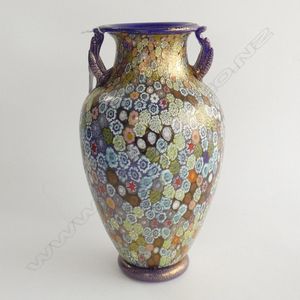Gilded Murano Glass Vase with Wing Handles
A modern Murano glass vase by Gabriele Urban millefiori murrines, heavily gilded on cobalt, with 'Wing' handles at the shouilder, height 11.02 in.
You must be a subscriber, and be logged in to view price and dealer details.
Register Now to view actual auction price for this item.
- Murrine - A murrine is created by building up a cane or rod of glass, by plunging the rod into a coloured glass, and then into a shaped dip mould, and repeating this procedure using different coloured glasses to build up a variety of layers. When the dipping is complete a longer cane is created by stretching the glass, and once cooled, can be cut, and the pattern will be revealed in the cross-section.
- Gilding - Gilding is a method of ornamentation whereby a thin sheet of gold metal is applied to items made of wood, leather, ceramics, glass and silver for decorative purposes.
For furniture including mirrors, the sheet of gold is usually applied over a coating of gesso. Gesso is a mixture of plaster of Paris and gypsum mixed with water and then applied to the carved wooden frames of mirrors and picture frames as a base for applying the gold leaf. After numerous coats of gesso have been applied, allowed to dry and then sanded a coat of "bole", a usually red coloured mixture of clay and glue is brushed on and allowed to dry, after which the gold leaf is applied. Over time parts of the gilding will rub off so the base colour can be seen. In water gilding, this was generally a blue colour, while in oil gilding, the under layer was often yellow. In Victorian times, gilders frequently used red as a pigment beneath the gold leaf.
Metal was often gilded by a process known as fire gilding. Gold mixed with mercury was applied and heated, causing the mercury to evaporate, the long-term effect of which was to kill or disable the craftsman or woman from mercury poisoning. The pursuit of beauty has claimed many victims, not the least of which were the artists who made those pieces so highly sought after today.
This item has been included into following indexes:
- glass, types or items - millefiore / millefiori 56
- millefiori - glass decoration style 66
- Venetian / Murano glass, housewares
